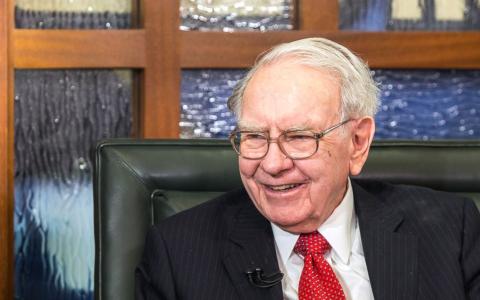
Warren Buffett is signaling caution.
The CEO of Berkshire Hathaway has significantly reduced the size of the company’s equity portfolio, is holding record cash levels, and, for the first time since 2018, hasn’t repurchased company stock, according to Berkshire’s third-quarter earnings and 10-Q report.
The absence of stock buybacks might be impacting Berkshire’s Class A shares, which dropped 2.6% to $660,500 on Monday. Buffett controls the buyback pace and doesn’t appear to find the stock attractively priced for repurchases.
Berkshire’s operating profits, excluding one-time currency losses, remain strong, climbing around 8% to $11.2 billion after taxes for the quarter.
Throughout this year, Buffett has cut Berkshire’s equity portfolio by over 25%, including a significant reduction in its Apple holdings, trimming the stake by 25% in the third quarter alone to 300 million shares, down from 905 million at last year’s close. Berkshire’s current equity holdings now stand at approximately $300 billion.
Buffett, along with investment managers Ted Weschler and Todd Combs, has found few opportunities in the stock market. Through nine months, stock purchases totaled $5.8 billion while sales hit $133 billion, largely driven by Apple. In the third quarter alone, purchases were limited to $1.5 billion against $36 billion in sales.
Despite a 25% gain in Berkshire’s stock this year, Buffett, who manages the share buyback program, seemingly doesn’t view it as undervalued. The company hasn’t repurchased any stock this past quarter, marking the first such gap since 2018, when Berkshire removed its buyback cap above 1.2 times book value.
The buyback halt extended into October, with no repurchases in the first three weeks of the quarter, based on share count data from the 10-Q report released with the earnings.
Berkshire repurchased only $345 million in stock during the second quarter and might reach just $3 billion in buybacks for the year, with $2.9 billion completed through the third quarter. This would mark the lowest annual repurchase since 2018, when the company bought back $1.3 billion, far below the $27 billion peak in 2021.
Berkshire hasn’t explained the buyback slowdown, unlike JPMorgan CEO Jamie Dimon, who indicated the bank had reduced repurchases due to record-high stock prices.
The likely reason for Berkshire’s buyback reduction is the stock’s 25% rally this year, making it less of a bargain compared to 2020 and 2021, when it traded at roughly half today’s levels. Berkshire’s Class A shares now trade at around 1.5 times Barron’s estimated book value—toward the higher end of its five-year range, though slightly down from a peak of nearly 1.7 times in September.
UBS analyst Brian Meredith estimates Berkshire’s intrinsic value—a sum-of-parts calculation—at roughly $702,000 per Class A share, about 5% above the current price. The stock has averaged a 15% discount to intrinsic value since 2016.
This suggests the stock trades close to intrinsic value, but Buffett seems interested in buying at a larger discount. His mandate is to repurchase shares only when they trade at a “conservatively determined” discount to intrinsic value, per Berkshire’s 10-K.
Berkshire has also spent little on acquisitions this year, totaling under $500 million, with just two significant deals in recent years: the $13 billion purchase of Pilot and an almost $12 billion acquisition of insurer Alleghany.
Given high stock and acquisition prices, Berkshire’s cautious stance appears set to continue.
Buffett’s long-sought “elephant-sized” acquisition remains elusive, and shareholders shouldn’t expect a dividend despite the large cash reserves. Buffett has resisted the idea, and many shareholders are content to let him hold cash for potential opportunities.
Correction: Ted Weschler, one of Buffett’s investment lieutenants, was incorrectly named as Todd Weschler in an earlier version of this article.
It’s apparent Buffett doesn’t view Berkshire’s stock as particularly cheap after its 25% gain this year through Friday. A previous version of this article incorrectly suggested Buffett saw the stock as undervalued.
Berkshire’s cash and equivalents rose by $48 billion to a record $325 billion as of Sept. 30, nearly double the year-end 2023 total. The figure is slightly inflated by around $15 billion due to Treasury bill purchases, yet it still reflects substantial cash levels.



